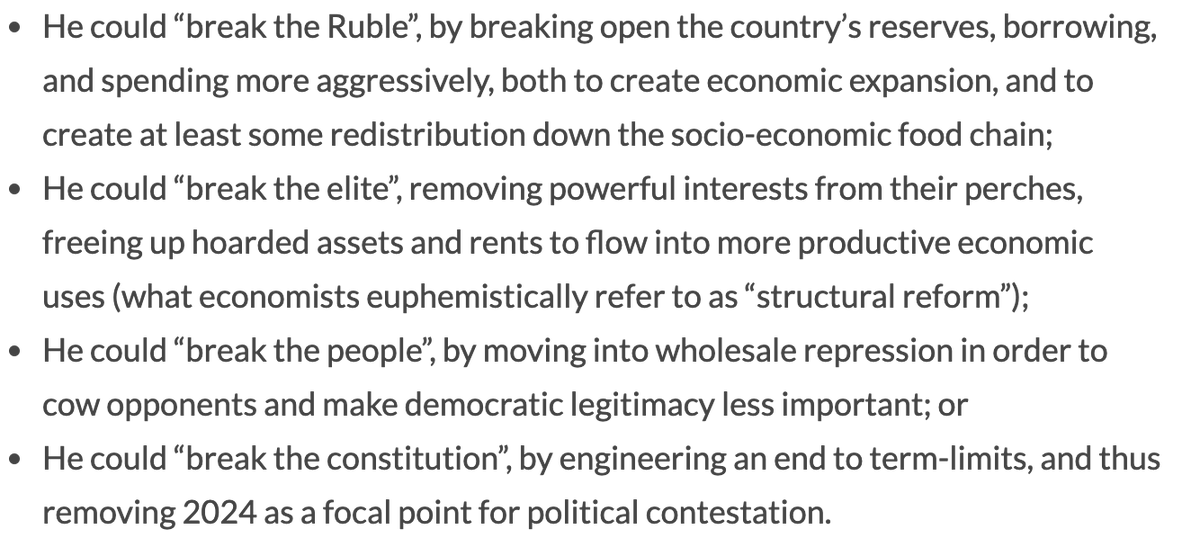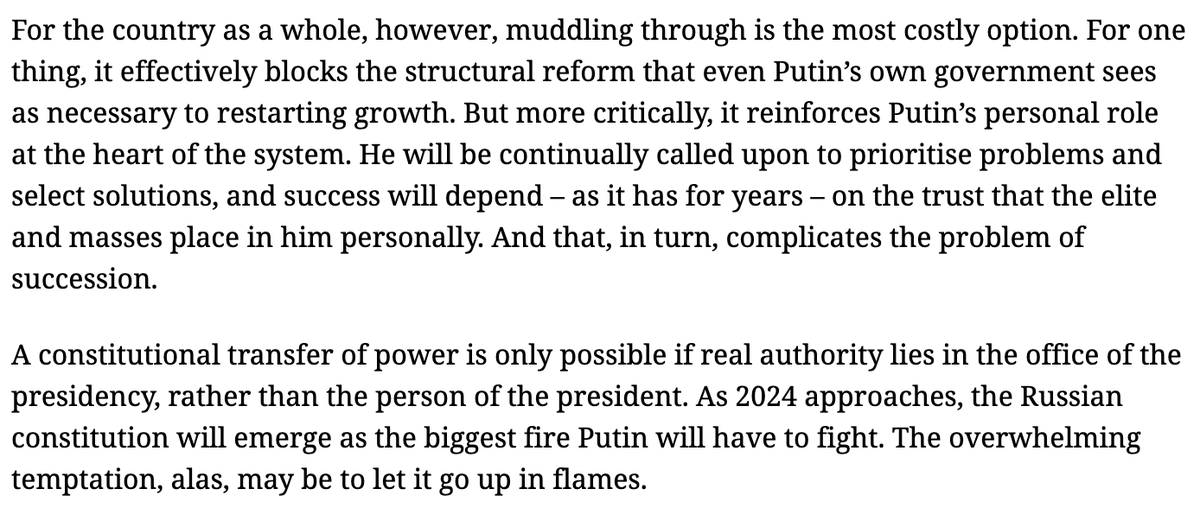
A thread, in which I admit a mistake of analysis.
TL;DR: I didn't think the Kremlin would go all in on repression as quickly and as deeply as it has.
/1
moscowonthames.wordpress.com/2021/04/30/no-…
TL;DR: I didn't think the Kremlin would go all in on repression as quickly and as deeply as it has.
/1
moscowonthames.wordpress.com/2021/04/30/no-…
There’s an adage in political science that you shouldn’t predict the future if you’re likely to live long enough to see it. It’s a good maxim, and while I generally try not to break it, I sometimes fail.
/2
/2
One of those times was back in November 2018, when I looked at the challenges facing Vladimir Putin, the options on his menu, and tried to predict what he’d do. Looking back, I was right about most things, but wrong about one. I wish I hadn’t been.
iiss.org/blogs/analysis…
/3
iiss.org/blogs/analysis…
/3
When you bear in mind that this was written a full year before Putin proposed constitutional reforms, that’s not a bad piece of political fortune telling!
/6
/6
The reasons for this were clear enough and remain, I think, true. Breaking the Ruble, while politically attractive, would mean undermining one of Putin’s golden rules: if you’re not solvent, you’re not sovereign.
/7
/7
Russia, of course, could borrow a lot before it faced a real debt problem, but Putin seems to see debt as a slippery slope and avoids it at all costs. Hence, the wholly underwhelming economic measures he proposed in his major policy address on 21 April:
/8
https://twitter.com/samagreene/status/1384841837349941249
/8
Breaking the elite, meanwhile, might have been possible at the height of Putin’s post-Crimea popularity — when any elite challenge would have been relatively easy to see off — but not once his numbers fell.
/9
/9
At the end of the day, the Kremlin understands that Putin’s power rests first on the quiescence of the elite, and then on the participation of ordinary citizens.
/10
/10
Keeping the elite on sides, then, was and remains a key priority, and, with the exception of a few gubernatorial shifts, we have seen precious little “structural reform” since 2018.
/11
/11
Where I was wrong, though, was on my prediction that Putin wouldn’t move to “break the people”. I wrote:
/12
/12

By the summer of 2019, it should have been clear that this prediction was wrong. The Kremlin ramped up arrests and street violence (albeit not to American levels on the latter count), culminating in the arrest of some 11,000 people in January 2021.
/13
/13
Since then, they have moved to bar autonomous political activity writ large: Navalny is in jail, and his organizations are on the verge of being declared ‘extremist‘.
meduza.io/en/news/2021/0…
/14
meduza.io/en/news/2021/0…
/14
Media outlets and even individual journalists are declared “foreign agents” and largely deprived of income.
themoscowtimes.com/2021/04/29/med…
/15
themoscowtimes.com/2021/04/29/med…
/15
And the lawyers who stand up to all of this in court are — for the first time anyone can remember — themselves subject to prosecution.
nytimes.com/2021/04/30/wor…
/16
nytimes.com/2021/04/30/wor…
/16
Why did I get this wrong? My only explanation is that I misunderstood the cost-benefit analysis from the Kremlin’s point of view.
/18
/18
My thinking had been that increased repression created risks, if only because it could spark an unpredictable dynamic of contention, the consequences of which would be difficult to calculate. Given that the relationship with the opposition was manageable, why risk it?
/19
/19
But from the Kremlin’s point of view, the question was evidently posed differently: was it riskier for the Kremlin to have an autonomous opposition, or to have none? The answer is clear.
/20
/20
As @freedomhouse recently reported, the Kremlin has gradually concluded that it is no longer bound by the niceties of democratic procedure, by its commitments under the European Convention on Human Rights, or even by its own constitution.
freedomhouse.org/report/nations…
/21
freedomhouse.org/report/nations…
/21
Exactly why this is, is the subject of a much longer piece of writing, but the fact remains. The Kremlin — much like the Chinese authorities in Hong Kong, or its neighbors in Minsk — has decided that outright repression is now a legitimate form of governance.
/22
/22
But that doesn’t mean the decision is without risk. China may never again be able to govern Hong Kong with the consent of its residents; Lukashenka’s rule will last only as long as the police are content to keep him in power. For the Kremlin, too, there is no turning back.
/END
/END
• • •
Missing some Tweet in this thread? You can try to
force a refresh




